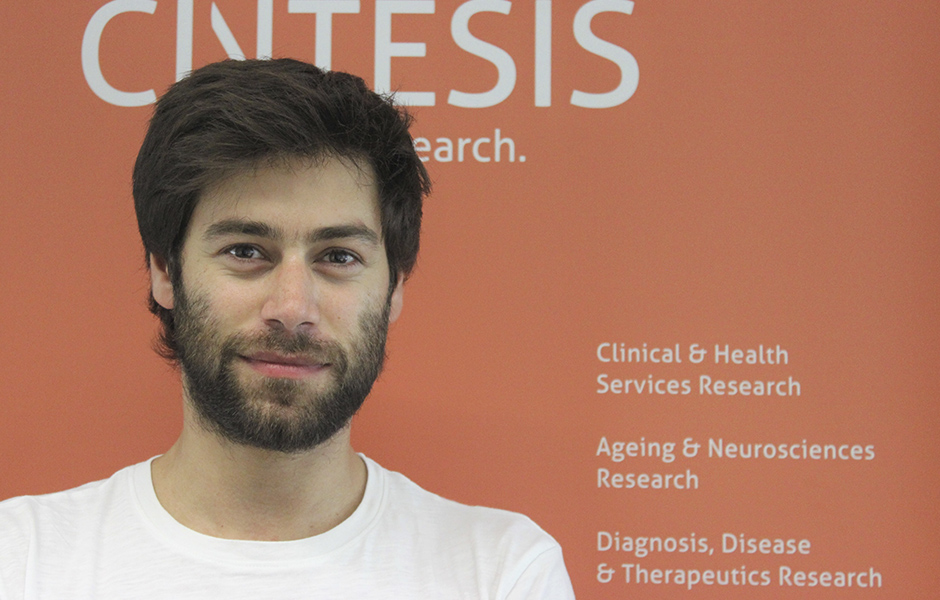Diogo Pestana is a CINTESIS – Center for Health Technology and Services Research researcher at NOVA Medical School – Faculty of Medical Sciences of the University of Lisbon, specialized in topics such as iodine and environmental pollutants that act as endocrine disrupters.
He was born in 1983, in Porto, where he also studied. He practiced swimming at the Futebol Clube do Porto and played water polo at Salgueiros. He graduated in Biology at the Faculty of Sciences of the University of Porto (FCUP), where he studied from 2001 to 2005. After his internship at FCUP, he received a scholarship at the Faculty of Pharmacy of the University of Porto (FFUP). In 2007, he “moved on” to the Faculty of Medicine of the University of Porto (FMUP) where he started working with the researcher Conceição Calhau (now a researcher at CINTESIS / NOVA Medical School), especially on the antioxidant effects of certain phytochemicals in an animal model. He completed a Master’s degree in Biology at FCUP (2009) and a PhD in Metabolism at FMUP (2013), spending nine months in Cambridge studying, to study the environmental pollutants that persist in the food chain and their effects on health.
He joined CINTESIS, in the ProNutri – Clinical Nutrition & Disease Programming, where he has participated in several projects, with emphasis on the IoGeneration, led by Conceição Calhau and financed in more than 400 thousand euros by ACSS/EEA Grants, to evaluate the iodine status in Portugal and the role of supplementation in schools. He now participates in the IoGeneration Lisbon project, which aims to raise awareness of adequate iodine intake. But also in the IoMum project, led by Elisa Keating (researcher at CINTESIS / FMUP and current leader of ProNutri), which is monitoring the status of iodine in Portuguese pregnant women and assessing the impact of supplementation.
He was a consultant for the Directorate-General for Health and was part of the “Industrially Contaminated Sites and Health Network” (ICSHNet) initiative, funded by a COST Action with the objective of establishing and consolidating a European network dedicated to the development of common strategies to deal with the problematic of the impact of industrial contamination on health. He continues to actively study the relationship between endocrine disrupters, namely persistent organic pollutants (POPs), derived from some pesticides (the case of DDT), and the development of inflammation and diseases such as obesity, diabetes and hypertension. He is a GuestAssistant Professor at the NOVA Medical School. Diogo Pestana has more than thirty published scientific articles and many medium and long term plans, one of which is to create the first Portuguese bank of fecal microbiota for transplant, within the scope of MYBIOME, a spin-off promoted by CINTESIS researchers.
1-Year Ambition
We know that changes in the microbiota are related to various pathologies and that their manipulation can help treat these diseases. This is an increasingly “hot topic”. At the moment, one of the strategies is the transplantation of fecal microbiota.
MyBiome emerged from the research developed in our CINTESIS group. A spin-off from the NOVA University of Lisbon, which competed for Portugal 2020 and will be financed to create, in Évora, a laboratory for the production of microbiota solutions and preparations for innovative therapies. We will have the first microbiota bank in Portugal. We are going to collect microbiota from healthy donors, whom we call “super donors”, which can be administered to patients for the treatment of certain pathologies, such as infection with Clostridium difficile.
10-Year Ambition
10 years from now, I see our spin-off rapidly developing and hope it will allow us to grow as a CINTESIS research group. One of the goals is that it can be an engine of new projects and collaborations. I want to continue to investigate endocrine disruptors, the environment and the effects of climate change on exposure to contaminants, including food contaminants. I also want to continue to raise awareness and alert people and politicians with responsibilities in these matters. This is a job that never ends.
Life beyond research
I live in Lisbon, but I go to Porto whenever I can. I like being with family and friends. I like to travel, with no set plans and feel part of the places I visit. I like sports, listening to music on vinyl records, taking pictures. I also like cinema, TV series and books. Reading is something I would like to do more.

